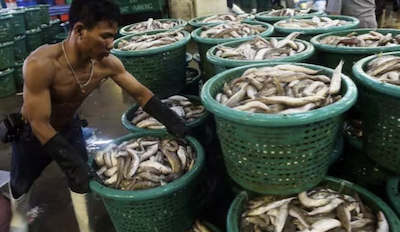
Today, the Seafood Working Group (SWG) relaunches its research and advocacy coalition with 23 official members and a new Advisory Body. The SWG is a global coalition of human rights, labor and environmental non-governmental organizations working together to develop and advocate for effective government policy and industry action to end the related problems of forced labor and illegal and unsustainable fishing practices in the international seafood trade.
Convened by Global Labor Justice-International Labor Rights Forum (GLJ-ILRF) since 2014, the SWG has focused its efforts on Thailand. As one of the largest producers and exporters of seafood worldwide, Thailand drew international attention when investigative journalists and human rights monitors uncovered egregious human rights abuse on Thai-flagged vessels, including fishers in situations of forced labor for up to 10 years. They were catching fish used to feed shrimp that were sold in leading supermarkets around the world, including Walmart, Carrefour, Costco and Tesco. These abuses were combined with illegal, unreported and unregulated (IUU) and unsustainable fishing methods that threatened to deplete the waters of Thailand and other nations of their fish stocks and precious marine biodiversity.
“When the SWG started, Thailand was ground zero for some of Asia’s worst abuses on fishing fleets, including long-term slavery, brutality and murder of migrant fishermen, but joint action and advocacy have helped significantly improve the situation,” said Phil Robertson, Deputy Asia Director at Human Rights Watch and a SWG Advisory Body member. “The solidarity of purpose to demand real change is what drives this innovative collaboration among human rights and environmental NGOs, trade unions, multi-stakeholder initiatives and companies.”
The impetus for the Working Group is our understanding that labor exploitation is often integrally linked to IUU and unsustainable practices in the seafood industry. Our membership includes environmental groups which have spent decades campaigning for practices that protect marine environments, and possess knowledge that can support campaigns for just working conditions and vice versa. It is only by working together, with environmental, human rights and labor organizations each contributing based on their unique expertise, that comprehensive solutions can be developed to fundamentally move the seafood sector towards more sustainable, rights-respecting practices.
In these six years, the SWG has had important successes, such as coordinating the international effort to stop the Thai government from using prison labor on fishing vessels; contributing to advocacy that led the Thai government to ratify ILO Convention 188 on Work in Fishing and the ILO Protocol of 2014 to the Forced Labor Convention; developing the Essential Elements of Effective Social Responsibility in the Seafood Sector for an effective human rights compliance program; and leading international advocacy for freedom of association and collective bargaining rights for migrant workers and against the use of defamation lawsuits against labor rights activists.
The SWG uses its collective strength to hold governments and corporations accountable for ensuring the rights of seafood workers. We build strategies and campaigns grounded in the priorities of seafood workers, trade unions and other frontline organizations. In Thailand, the SWG has sought to amplify the advocacy demands of the Thai labor movement and civil society organizations, groups such as the Migrant Worker Rights Network (MWRN), the Human Rights and Development Foundation (HRDF), and the State Enterprise Workers’ Relations Confederation (SERC), who have fought for decades for equal rights for migrant workers to exercise their rights to freedom of association and collective bargaining.
The SWG plans to expand its efforts to Taiwan during 2020, and then to other countries in the Asia-Pacific region. SWG members and local labor and environmental organizations are already working to address severe human rights abuses experienced by migrant fishers in Taiwan’s distant water fleet. There are strong linkages within the seafood industry across the region both in terms of trade ties and migration pathways, with migrant workers from Cambodia, Indonesia, Myanmar, the Philippines, and other countries making up much of the workforce. National governments throughout the Asia-Pacific also countenance similar types of human rights abuses against migrant fishers and make it more difficult, through legal and administrative challenges, for unions and worker organizations to protect them. Restrictive and discriminatory legal frameworks around recruitment, wages and conditions of work, and seizure of documents contribute to human trafficking. So it’s no surprise that the companies exporting seafood from these countries, and retailers buying seafood from these supply chains, often fail to uphold workers’ fundamental labor rights.
“Environmental protection and human rights protection in fisheries are interdependent and require strong collaboration between human rights, labor and environmental organizations at the local and international levels. The SWG is well positioned to support the efforts of local groups in Taiwan and bring more international attention to the persistent human rights and environmental abuses in the Taiwanese distant water fishing fleet,” said Andy Shen, Senior Oceans Adviser at Greenpeace USA and a SWG Advisory Body member.
Through strengthened membership and expanded activities in the region, the SWG will foster solidarity between workers across the Asia-Pacific and harness the strength of transnational advocacy and campaigning. Through regional collaboration we will end forced labor, promote decent work and contribute to an environmentally sustainable seafood industry in which human rights are paramount.


